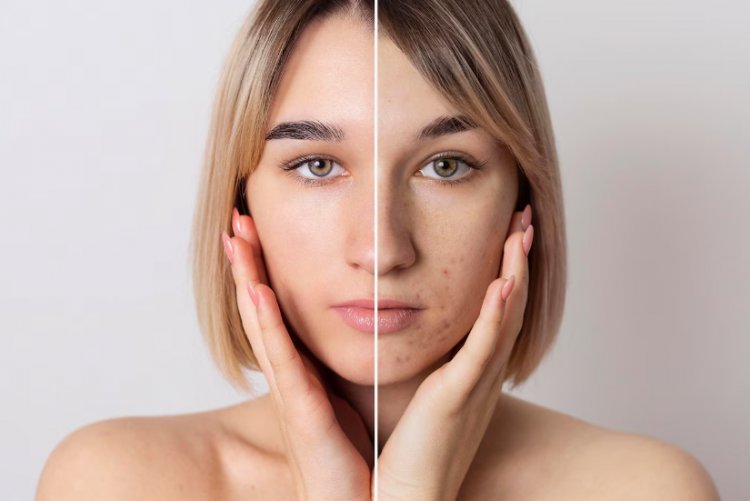Common Skin Conditions: Understanding, Treatment, and Management
The skin, our body's largest organ, serves as a protective barrier against external threats while also being a canvas for self-expression. However, despite its resilience, the skin is susceptible to various conditions that can affect its health and appearance. Understanding these common skin conditions, along with their treatment and management, is crucial for maintaining optimal skin health. #SkinConditions #Dermatology #SkinHealth #AcneTreatment #EczemaManagement #PsoriasisAwareness #RosaceaCare #DermatitisTreatment #HivesRelief #BurnManagement #FungalInfections #SkinClinicsUK #SkinClinicsTurkey #Healthcare #Wellness #SkinCareTips #Dermatologist #HealthySkin #SelfCare

1. Acne:
Acne is perhaps one of the most well-known skin conditions, affecting millions of individuals worldwide, particularly during adolescence. It occurs when hair follicles become clogged with oil and dead skin cells, leading to the formation of blackheads, whiteheads, pimples, and sometimes cysts. While hormonal changes play a significant role in acne development, factors such as genetics, diet, and skincare practices also contribute. Treatment options range from over-the-counter topical creams to prescription medications and lifestyle modifications.
2. Eczema:
Eczema, or atopic dermatitis, is a chronic inflammatory skin condition characterized by red, itchy rashes. It often begins in childhood and may persist into adulthood, causing significant discomfort and impacting quality of life. Triggers for eczema flare-ups vary but commonly include allergens, irritants, climate changes, and stress. Management involves moisturizing the skin, avoiding triggers, using topical corticosteroids or immunomodulators, and practicing stress-reduction techniques.
3. Psoriasis:
Psoriasis is an autoimmune disorder characterized by the rapid turnover of skin cells, resulting in the formation of thick, red, scaly patches. It can affect any part of the body, including the scalp, elbows, knees, and lower back. While the exact cause of psoriasis remains unknown, genetic predisposition, immune system dysfunction, and environmental factors are believed to play a role. Treatment options include topical medications, phototherapy, oral medications, and biologic therapies.
4. Rosacea:
Rosacea is a chronic inflammatory skin condition that primarily affects the face, causing redness, flushing, visible blood vessels, and sometimes pimples or bumps. It typically occurs in adults between the ages of 30 and 50, with fair-skinned individuals being more susceptible. Triggers for rosacea include sun exposure, hot or spicy foods, alcohol consumption, and stress. Management strategies involve identifying and avoiding triggers, using gentle skincare products, topical medications, and in severe cases, laser therapy.
5. Dermatitis:
Dermatitis refers to inflammation of the skin, which can result from various causes, including allergies, irritants, infections, and genetic factors. Common types of dermatitis include contact dermatitis (from exposure to irritants or allergens), atopic dermatitis (eczema), and seborrheic dermatitis (affecting oily areas of the skin). Treatment typically involves identifying and avoiding triggers, using emollients and topical corticosteroids, and practicing good skincare habits.
6. Hives:
Hives, also known as urticaria, are raised, itchy welts that appear suddenly on the skin. They are often the result of an allergic reaction to food, medication, insect bites, or environmental factors. While hives usually resolve on their own within a few hours, antihistamines may help alleviate symptoms in severe cases.
7. Burns:
Burns occur when the skin is exposed to excessive heat, chemicals, electricity, or radiation, resulting in tissue damage. The severity of burns is classified into first-degree, second-degree, and third-degree burns, depending on the depth and extent of tissue involvement. Treatment varies depending on the severity of the burn and may include wound care, pain management, and, in severe cases, skin grafting.
8. Dermatophyte Infections:
Dermatophyte infections, commonly known as fungal infections, affect the skin, hair, and nails. These infections, caused by various fungi species, include athlete's foot (tinea pedis), ringworm (tinea corporis), and nail fungus (onychomycosis). Treatment typically involves topical or oral antifungal medications, along with measures to prevent recurrence, such as keeping the affected area clean and dry.
In conclusion, understanding common skin conditions is essential for effective treatment and management. If you're experiencing any skin issues, it's crucial to consult a dermatologist for proper diagnosis and personalized treatment recommendations. Additionally, adopting a healthy lifestyle, practicing good skincare habits, and avoiding known triggers can help promote optimal skin health and overall well-being.
Centers or Clinics in the United Kingdom:
-
The London Skin and Hair Clinic: Located in London, this clinic offers comprehensive dermatology services, including diagnosis and treatment of various skin conditions such as acne, eczema, psoriasis, and rosacea.
-
The Harley Street Dermatology Clinic: Situated in the renowned Harley Street medical district in London, this clinic specializes in the diagnosis and management of skin disorders, offering personalized treatment plans tailored to individual patient needs.
-
The Cadogan Clinic: Based in Chelsea, London, The Cadogan Clinic provides a wide range of dermatological services, including consultations with expert dermatologists, advanced skin treatments, and cosmetic dermatology procedures.
-
The Sk:n Clinic: With multiple locations across the UK, Sk:n Clinic offers professional dermatological services, including treatments for acne, eczema, psoriasis, and other common skin conditions, as well as laser therapies and cosmetic procedures.
-
Nuffield Health: Nuffield Health operates numerous hospitals and medical centers throughout the UK, offering dermatology services, consultations, and treatments for various skin conditions delivered by experienced dermatologists and healthcare professionals.
Centers or Clinics in Turkey:
-
American Hospital Istanbul Dermatology Clinic: Located in Istanbul, this clinic provides a wide range of dermatological services, including diagnosis and treatment of skin conditions, cosmetic dermatology procedures, and laser therapies.
-
Acibadem Hospitals Group Dermatology Clinics: Acibadem Hospitals Group operates several hospitals and medical centers across Turkey, offering comprehensive dermatology services, advanced treatments, and surgeries for skin disorders.
-
Koc University Hospital Dermatology Department: Situated in Istanbul, the Dermatology Department at Koc University Hospital provides specialized care for various skin conditions, utilizing the latest advancements in dermatological treatments and technologies.
-
Liv Hospital Ankara Dermatology Clinic: Liv Hospital Ankara offers expert dermatological services, consultations, and treatments for patients with skin conditions, including acne, eczema, psoriasis, and dermatitis.
-
Anadolu Medical Center Dermatology Clinic: Located in Gebze, near Istanbul, Anadolu Medical Center's Dermatology Clinic offers a wide range of services, including diagnosis, treatment, and follow-up care for patients with skin disorders, under the supervision of experienced dermatologists.

Discover Coupoly's exclusive Medical Concierge Service, connecting you with renowned doctors and clinics, whether in the UK or abroad.
Get in Touch
Disclaimer:
The information provided in this article is for educational purposes only and should not be considered medical advice. If you have any health concerns or are experiencing symptoms, it is important to consult with a healthcare professional, such as a doctor or clinic, for proper diagnosis and treatment. Always seek the advice of your doctor or other qualified health provider with any questions you may have regarding a medical condition. Do not disregard professional medical advice or delay in seeking it because of something you have read in this article.
What's Your Reaction?





















